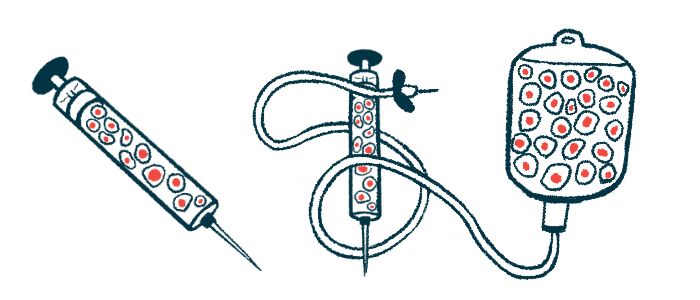Antioxidant CoQ10 May Allow Better Stem Cell Treatments for IPF
Written by |

Coenzyme Q10 (CoQ10), an antioxidant found naturally in the body and some foods, may help airway basal stem cells survive and ease symptoms of idiopathic pulmonary fibrosis (IPF), a study in mice given both in a transplant suggests.
Researchers observed that more airway basal stem cells, a type of adult lung stem cell that can divide to make new cells, remained alive when mixed with CoQ10. This occurred even in the presence of hydrogen peroxide, a chemical made up of oxygen and hydrogen atoms that can damage cells and trigger inflammation.
When given to the injured lungs of an IPF mouse model, stem cells mixed with CoQ10 helped to lessen the growth of fibrous scar tissue and lower the number of inflammatory cells entering the tissue.
“The combination with CoQ10 improved the transplantation efficacy,” leading to “better therapeutic effects,” the researchers wrote.
The study, “CoQ10 enhances the efficacy of airway basal stem cell transplantation on bleomycin-induced idiopathic pulmonary fibrosis in mice,” was published in the journal Respiratory Research.
Stem cells hold potential in treating diseases like IPF, where tissue is damaged and in need of repair. Airway basal stem cells, in particular, have shown an ability to grow new lung tissue after injury and to ease lung scarring in mice.
“However, cell survival is affected by the microenvironment during transplantation, and the efficacy of cell transplantation is a standing challenge,” the researchers wrote. Basal airway stem cells, specifically, “under oxidative stress in the alveolar microenvironment are poor in survival.”
Oxidative stress results from an imbalance between the production of free radicals (reactive oxygen-containing molecules) and the body’s ability to eliminate them.
A team of researchers in China thought an antioxidant might quench the stress these cells experience after transplant to make the procedure more effective.
They focused on CoQ10, a vitamin-like nutrient the body needs in only tiny amounts to work well and stay healthy. CoQ10 helps prevent cell damage caused by oxidant molecules like hydrogen peroxide.
To understand CoQ10’s potential, researchers first mixed stem cells from the lungs of chronic cough patients with hydrogen peroxide. They then treated some of the cells with CoQ10, while leaving others untreated.
CoQ10 was seen to protect cells against the stress induced by hydrogen peroxide and to result in fewer dead cells.
Next, researchers turned to a mouse model with fibrosis induced by administering bleomycin — a chemical that causes DNA to break, resulting in inflammation — directly into the lungs.
Seven days after being exposed to bleomycin, mice underwent a transplant with airway basal stem cells — either alone or mixed with CoQ10 the previous day. A group of mice with no transplant served as controls.
Researchers watched for changes in the levels of hydroxyproline, a marker of IPF, and found these levels were lower in mice with transplanted stem cells than in control mice, and particularly lower in those that received CoQ10-mixed stem cells.
Similar findings were observed for the levels of collagen, a fibrous protein that contributes to tissue scarring.
The number of inflammatory cells entering injured lung tissue was also lower in mice that received stem cells relative to control mice. Again, while the stem cells alone had therapeutic effects, these were generally greater when CoQ10 was added.
“In the present study, we observed that administration of [stem cells] combining with CoQ10 into lung tissue of mice 7 days after bleomycin instillation, ameliorated [disease-associated] characteristics of lung tissues and prevented pulmonary fibrosis development,” the researchers wrote.
“CoQ10 played a protective role to BCs [airway basal stem cells] against oxidative stress and enhanced the differentiation of transplanted BCs, which indicates that CoQ10 may improve the survival rate of transplanted cells in the pulmonary microenvironment,” they added, noting that further study is needed.






